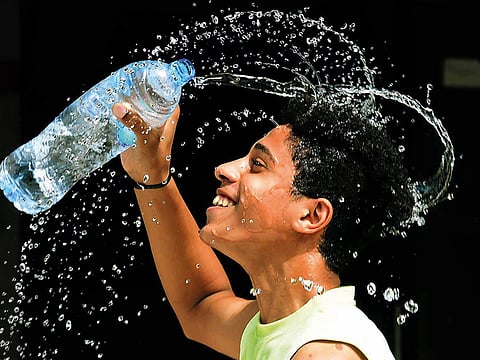UAE residents not drinking enough water, say experts
This increases chances of dehydration in summer as fluids and salts are lost rapidly from the body

Dubai: People living in the soaring summer heat of the UAE are not drinking enough water to keep their bodies hydrated, Dubai-based experts have said.
With summer being the longest season in the UAE, not maintaining proper body water level throughout can lead to an array of physical impairments.
Dr Roshan Oommen, general physician at Aster Clinic, Karama, said UAE residents are easily falling below the recommended two to three litres per day, failing to perform one of the simplest yet crucial tasks of drinking water.
During the summer and while outside temperatures soar into the high 40 degree Celsius, there are increased chances of dehydration as fluids and salts are lost rapidly from our body, he explained, and children can be at risk as they tend to get dehydrated quicker.
“People often miss out on drinking water as, during the day, they are caught up with their busy schedules. Many think that it is good enough to drink water only when they are thirsty, which is not the case,” said Dr Oommen.
It becomes extremely important to drink water at regular intervals throughout the day to hydrate the body in order to replace the water that is lost by sweating and urinating, he added.
“Approximately, 70 per cent of the human body is made up of water, so in order for organs and cells to function efficiently, the body requires water.”
Dr Oommen said when the body starts losing more water than it consumes, dehydration occurs, preventing it from performing its normal daily functions.
“The slightest percentage of dehydration can harm the body,” he pointed out. “Exhaustion or fainting is one of the most common after effects of dehydration. The blood becomes thick because of the lack of water, making it difficult for the body’s cardiovascular system which compensates it by increasing the heart rate to maintain a normal blood pressure.”
In such situations, if the body is pushed to work or exposed to heat, there is a risk of exhaustion, he added.
“With reduced water consumption, a person tends to urinate less because the cell functions are affected and sufficient water doesn’t reach the organs of the body. This triggers the kidneys to retain water. Water helps in regulating normal body temperature which gets affected when the body gets dehydrated,” he explained.
Dehydration also often causes dryness in the mouth, as reduced water levels in the body cause the salivary glands to produce less saliva which also cause bacteria build up.
He further said there is not always a visible symptom of dehydration which is why it is extremely important to keep drinking water at regular intervals throughout the day.
“Some of the symptoms include increased thirstiness, dry mouth and tongue, headache, less frequency of urination and dark-coloured urine. Dehydration can result in weakness, tiredness and muscle cramps.”
Dr Shyam Raja Mohan, specialist internal medicine at Prime Hospital, said more cases of dehydration during the summer months are especially affecting people with increased physical exertion and outdoor jobs.
“The amount of water required per day depends on the environment, level of physical activity and health status. When outdoors, one must drink lots of fluids. It’s ideal to use fluids with water and electrolytes like sodium and chloride at least every half hourly when outdoors.”
Apart from drinking water, consuming fruits high in water content like cucumber, watermelon and tomato to keep the skin and digestive system healthy.
“The summer season makes people want to drink something chilled, causing people to drink juices and other aerated drinks, but no amount of other fluids can compensate for water,” added Dr Oommen.
Tips for hydration
- Drink plenty of water. Water is the most important thing to keep yourself hydrated
- If drinking water is boring, you can tweak simple plain water by adding your favourite fruits in water which makes it incredibly refreshing and gives a new taste to water
- Make healthy food choices and consume lots of fruits and vegetables high in water content like cucumber, tomato, watermelon etc
- Cut down on caffeinated drinks and aerated beverages. Coffee further dehydrates the body, instead switch to flavoured tea
- Drink coconut water as it is a rich source of magnesium and potassium and is very low in calories. Coconut water also contains electrolytes which replenishes energy
- Avoid direct sunlight during peak hours whenever possible
Courtesy: Dr Roshan Oommen



